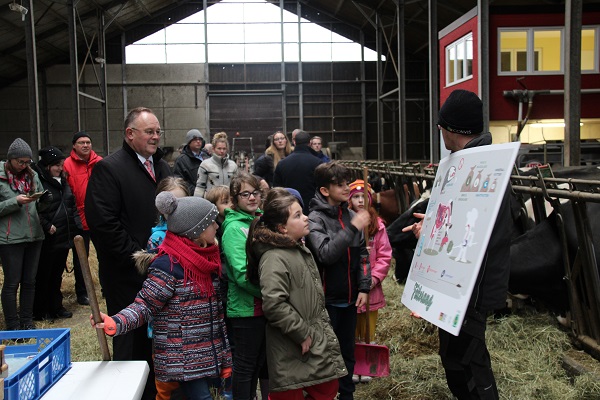 Milk Week 2019: children accompanied by Romain Schneider, Minister of Agriculture, Viticulture and Rural Development;
Credit: MA
Milk Week 2019: children accompanied by Romain Schneider, Minister of Agriculture, Viticulture and Rural Development;
Credit: MA
Milk Week 2019, being held from 12-18 December, will see 1,890 students will get a glimpse into the life of milk producers in Luxembourg.
For this fifth edition of the Milk Week, 62 dairy farms (10% of dairy farms in Luxembourg) are opening their doors to 1,890 primary school students, allowing them to discover milk production and the daily work of dairy producers in Luxembourg. Indeed, the goal of this initiative is to make children aware of the source of their food from an early age and to promote awareness of the benefits of a healthy and balanced diet.
On Friday 13 December 2019, Luxembourg's Minister of Agriculture, Viticulture and Rural Development, Romain Schneider, accompanied a class of students during their visit to the Biver-Haan Marthe et fils farm in Kehlen. On this occasion, Minister Schneider emphasised that the initiative, which is organised by the Ministry's Rural Economy Service, would not be as successful without the support of the Lëtzebuerger Landjugend & Jongbaueren, Service Jeunesse- Lëtzebuerger Bauerejugend and the Association pour la promotion des fermes d'accueil et pédagogiques au Grand-Duché de Luxembourg (APFAPL).
This educational measure forms part of the European fruit, vegetables and milk in schools programme, which has been in force since 2017/18. The programme supports the distribution of products, as well as educational measures. In fact, during the 2018/19 school year, more than 103,000 students were able to benefit from the distribution of more than 140,000 litres of dairy products and 414,000 kg of fruit and vegetables in Luxembourg. The total budget for the “Schoulmëllech- a Schouluebstprogramm” thus amounted to €981,171, 55% of which was funded by the European Union and the rest by the Luxembourg State.
Organic milk represented almost 30% of the milk delivered to schools compared to 15.8% in 2017/2018. In addition, during the current school year, primary schools will receive carrots produced by a Luxembourg organic farm for the first time. Products from organic farming will thus represent 36% of the fruits and vegetables distributed. Moreover, in an attempt to reduce waste, schools will be able to order milk in 10-litre packaging from 2019/20 onward.








